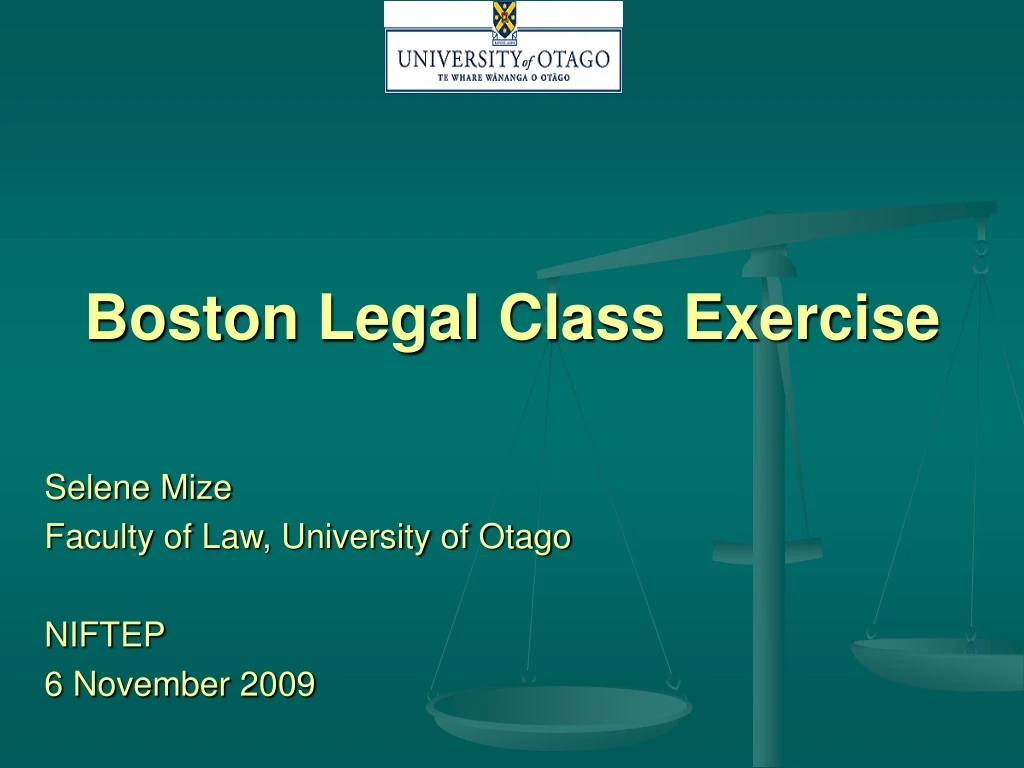In the Reading, Richard Glatz Defined the Notion of "Role-differentiated Morality." This Refers to

 Download
Download Skip this Video
Loading SlideShow in 5 Seconds..
Boston Legal Form Exercise PowerPoint Presentation
Boston Legal Course Exercise
Download Presentation
Boston Legal Course Practice
- - - - - - - - - - - - - - - - - - - - - - - - - - - Due east Northward D - - - - - - - - - - - - - - - - - - - - - - - - - - -
Presentation Transcript
-
Boston Legal Class Do Selene Mize Faculty of Law, Academy of Otago NIFTEP 6 Nov 2009
-
The Exercise • Underlying case • Lawyers • Watch clips • Jot down one or two sentences for each of the following questions: • Would you crush a close friend to win a lawsuit? • In a nutshell, what is the nature of the human relationship between a lawyer and client? • What does it take to be an ethical lawyer? • (There is no one right answer.)
-
Would You Vanquish a Friend to Win a Lawsuit? • Thoughts?
-
Former Students • 49% said no or probably not • 24% said maybe, it depends, or I hope non • 24% said yes, probably, or if the situation required it • three% did not answer or didn't know
-
Those Maxim Yes • Protection of the client • "You accept an adjuration to defend your customer, not exist kind to your friends" • "I would do what is best for my client" • "The client takes priority" • Function differentiated morality • "Friendship and work should exist separated, so yes" • "Personal relationships should not touch on how you lot do your duty and job equally a lawyer" • "It'south just business organization"
-
Some were trigger-happy • "Damn correct!" • "Hell yeah!" • Some were reluctant, • "Information technology would be difficult and I would be more to mediate equally much as possible first but I suppose if the job requires you to win a case - that'south what I would try to do" • "If there were no alternatives"
-
Reciprocity was often mentioned • "Yes, I'd expect the aforementioned of them" • "Hopefully my friend would practice the same to me" • Guilt too • "Perhaps, but feel bad afterwards"
-
Those Saying Perhaps or It Depends • Situational factors (disliked by many philosophers, in fact powerful determinants) • "If the case were important enough" • "That would ultimately on how important the outcome of the case would be to my client vs how bad my friend would experience. Some things are more than important than preserving others' feelings." [Do Jerry's interests weigh every bit with the customer's?]
-
Distinguishing between crushing the friend in legal and personal means • "That is non police" • "Not in the unprofessional and completely irrelevant fashion on the clip" • "Yes but within limits, professionally" • Equivocal • "Hopefully non, simply perhaps yep" • "I don't know only I would similar to say no" • [Here we oftentimes talk over difficulties in predicting behaviour, and the influence of pressure on decision-making]
-
Those Saying No • "NO! One of the greatest fears I have in entering the legal organization is that I may have to compromise my values and integrity. This goes against everything I have been taught and everything I believe." • "No, you lot wouldn't endeavour and beat anyone" [deontological] • "Friendship is also of import"
-
"It is dirty and immoral" • "It is not really legal statement" • "The purpose of every lawsuit is to determine truth in a respectful manner for both parties" • "No, only don't tell my clients!" • "What goes around comes effectually" [businesslike vs ethical reasoning]
-
1 person wrote "yes" and then crossed it out and wrote "depends" and then crossed it out and wrote "no". I praise the reflection at work in this respond.
-
Why I Apply this Exercise • By making students plow in the form, they become actively involved, rather than remaining solely passive observers in class (ideally, setting a trend for the rest of the semester) • Doing it on the get-go twenty-four hour period of grade, student motivation is unremarkably very high • Curiosity about a new subject • Assignments and exam prep not yet making alien demands on fourth dimension • At the outset of the semester, students can't easily estimate my ain views, and try to feed back what they think I want to hear
-
It introduces the function of lawyers -- a subject we will render to at several points during the semester
-
The Relationship Between Lawyers and Clients • What is the essence of a lawyer'southward job? • To assist the client achieve his or her aims • Ensure the process runs correctly • ???
-
What Does information technology Take to Be an Ethical Lawyer? • Student answers often mention: • Philosophy • Personal morality • Role-differentiated morality • Situational factors • Care for others
-
I Tell Students: • Some people determine their ethics from an exterior source (eg religion) • Some model themselves on a role model's graphic symbol or actions • Some start from an overall philosophy, and motility to the specific applications • Some introspect and accomplish decisions for specific situations, and leave m philosophies for afterward (or never)
-
There are lots of ways, all justifiable, to reach 1's personal sense of ethics (and it doesn't happen overnight) • Ultimately, defining morality is a personal affair. You are morally and legally responsible for your ain behaviour. Ideals is about having integrity (making consequent principled decisions which are consistent with your values) and being proud of your own deportment. Y'all may exist persuaded by others, simply yous should not turn down to make your own ethical judgments.
Source: https://www.slideserve.com/charlessnyder/boston-legal-class-exercise-powerpoint-ppt-presentation

0 Response to "In the Reading, Richard Glatz Defined the Notion of "Role-differentiated Morality." This Refers to"
Publicar un comentario